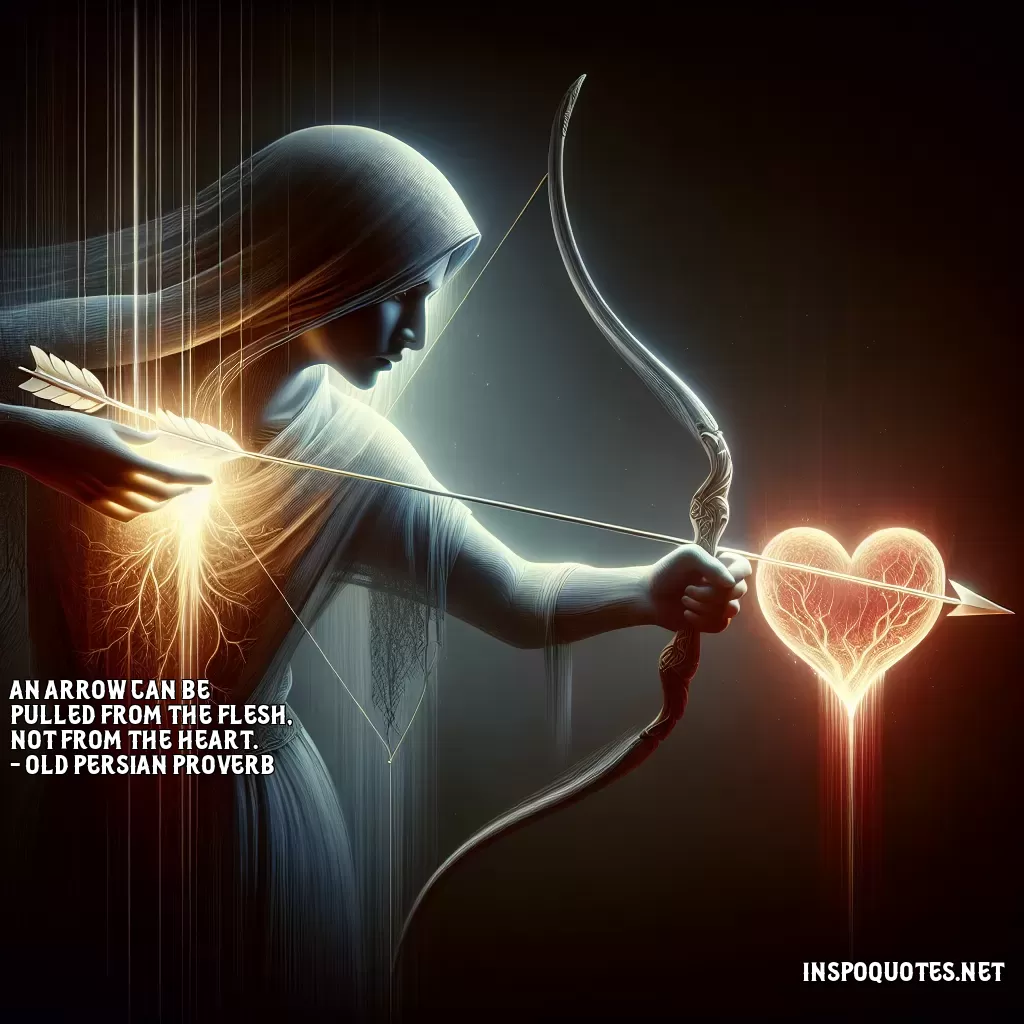
An arrow can be pulled from the flesh, not from the heart. - Old Persian Proverb
Author: Old Persian Proverb
👁️ 8 views

An arrow can be pulled from the flesh, not from the heart. - Old Persian Proverb
👁️ 8 views
The Old Persian Proverb, "An arrow can be pulled from the flesh, not from the heart," uses the metaphor of an arrow to illustrate the difference between physical and emotional injuries. Physical wounds, symbolized by an arrow in the flesh, are typically more straightforward to address. With time, care, and medical intervention, such injuries can heal and often leave little more than a scar as a reminder of the pain. On the other hand, an arrow in the heart represents emotional and psychological wounds, such as betrayal, loss, or heartbreak. These types of injuries are vastly more complex and challenging to heal. Unlike physical wounds, emotional injuries often linger in the mind and soul, difficult to remove or resolve entirely. They can affect an individual's mental wellbeing, outlook on life, and relationships with others. This proverb suggests that emotional pain is more profound and lasting than physical pain. It also implies the necessity of addressing both types of wounds in different manners. While physical wounds can often be healed with straightforward remedies, emotional wounds require introspection, understanding, and sometimes external support such as therapy to begin to mend. Ultimately, this proverb reminds us of the importance of empathy and compassion in dealing with others. In recognizing the invisible burdens people carry within their hearts, it encourages thoughtful interaction and support, fostering an environment where emotional healing is supported and understood as a vital aspect of human experience.
Quote By: Old Persian Proverb
**Old Persian Proverb: Wisdom Through Time**
The Old Persian Proverb is a fascinating reflection of the rich cultural and linguistic heritage of ancient Persia, known today as Iran. Rooted in the Achaemenid Empire, which flourished from the 6th to the 4th centuries BCE, these proverbs encapsulate the wisdom, values, and everyday experiences of the Persian people. Much like the proverbs found in other cultures, Old Persian Proverbs often offer insights into human nature, morality, and the workings of society, providing a glimpse into the mindset of an ancient civilization.
One of the most notable aspects of Old Persian Proverbs is their profound simplicity and depth. The proverbs, which were primarily oral in tradition, served as a means of preserving knowledge and handing it down through generations. Scholars have often commented on how these succinct expressions highlight fundamental truths about life and the human condition, demonstrating the philosophical inclinations of the Persian people. The wisdom contained in these sayings often transcends time and remains relevant even in contemporary discussions on ethics and personal conduct.
The Old Persian language itself, which is an early form of the Persian language, contributes to the charm and historical significance of these proverbs. Linguists and historians, such as the notable scholar David L. Cooper, have dedicated much time to studying the language and the ancient texts that contain these sayings, recognizing their role in understanding Persian history and literature. Through Cooper's work, the connection between language and culture becomes evident, shedding light on how the Old Persian Proverbs reflect the values of a society that prized wisdom, justice, and community.
In conclusion, Old Persian Proverbs stand as a testament to the enduring legacy of Persian culture and wisdom. They serve not only as linguistic artifacts but also as portals to understanding the moral and philosophical underpinnings of an ancient civilization. Whether quoted in academic texts or casually shared in conversation, these proverbs continue to resonate, inviting new generations to ponder the wisdom of their ancestors. Through the exploration of Old Persian Proverbs, we gain insight into the timeless human experience, where the past informs the present and shapes the future.